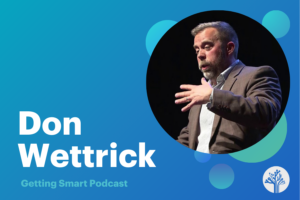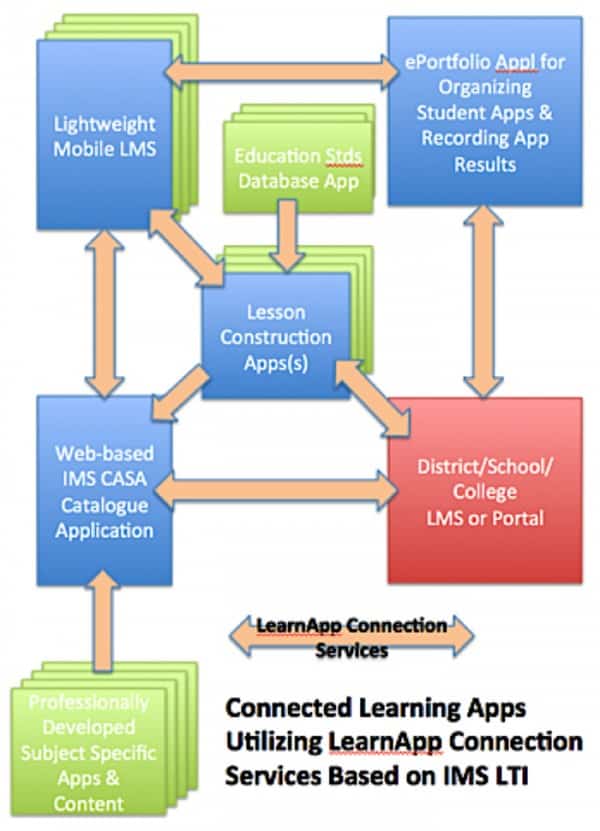It’s Time For Students To Own The Student Record: B2C LMS Companion

Some learning management systems have half decent mobile functionality. Some actually appear to have been designed with students in mind. But the data and work produced on them belongs to the institutio. Finish the course, leave the school, and it’s all gone.
Now that learners are mobile, in terms of technology and degree completion strategies, wouldn’t it be cool if they had an app that helped them make and monitor academic plans, build a profile, and assemble a portfolio of personal bests?
In 2012 Digital Learning Now published a paper titled Data Backpacks: Portable Records & Learner Profiles. The papers advocates for an expanded parent-controlled profile that could include:
- Expanded achievement data
- Motivational preference (i.e., experiences that produce persistence and performance)
- A narrative discussion of learner assets and challenges
- A full portfolio of student work
- A college and career readiness tracker
- Habits of success tracker
- Work experience history
- Community service history
The Data Backpacks paper recognized that they key to embracing privacy and personalization is permissions and portability. The paper was aimed at K-12, but it may be even more important for postsecondary learners to control and cultivate a portable professional profile.
A growing number of colleges encourage learners to launch and cultivate an online presence. Mary Washington University’s Domain of One’s Own is a good example. MWU pays for the domain while students are enrolled and students pick up the tab when they leave school.
Similarly, secondary and postsecondary students should have cost-free access to a personal companion to the school’s learning management system, a business to consumer (B2C) LMS companion that is a private, portable profile. A permission system would allow the learner to decide what to share with whom.
The B2C LMS companion would have goal setting functionality like GoalBook, a cloud based portfolio system, and links to social media. The postsecondary version could feature financial data: cost to complete, aid opportunities, and payment schedule.
Portable student profiles are part of what Phil Hill calls the shift from a walled garden approach to an open garden approach that allows the coordination of the base system with external tools.
Professional schools hoping to support lifelong learning plans should have particular interest in the B2C LMS companion. They may offer to sponsor the portable profile app so they can recommend learning experiences related to individual development plans, certification requirements, and industry developments.
Rob Abel, CEO of IMS Global Learning Consortium, the interoperability folks, likes the idea of the LMS companion. Following is a picture of how interoperability guys like Rob think about a bridge to the institutional LMS (and data) and a much more effective ecosystem of educational apps outside the institution.
“I’ve had that picture and various versions of it for at least six to seven years now,” said Abel. “We use that picture to rally some of the mobile-focused suppliers on the idea.” He’s got meetings next month that may lead to a pilot project.
IMS supported developmental work on an Education and Career Positioning System championed by Lonestar College System. At a community college convening, Lonestar chancellor Richard Carpenter challenged the audience of community college leaders to transform what colleges can do for students by enabling students to “own the student record.”
Carpenter said that institutions need to help students understand opportunities, create and organize the artifacts from their learning according to critical competencies, and ultimately enable students to “take this with them” throughout their lives. (See feature on Quest, a great early college high school, a great partnership between Lonestar and Humble ISD)
IMS open standards can play a vital role in opening up the data and work product created in a variety of EdTech and export to the student record, “The one owned by the student of the future,” according to Abel.
The LMS market (postsecondary and corporate training) has revenues of more than $3 billion. A new category of B2C LMS companions could add another $1 billion to the growing category and could boost efficacy, engagement and learner satisfaction along the way.
This blog is part of the Learning Platforms Series brought to you by The Bill & Melinda Gates Foundation. For more, stay tuned in for the final published project, Getting Smart on Next-Gen Learning Platforms and check out additional posts in the series:
- Encourage Writing with a Domain, Blog & Portfolio
- From Turn-It-In to Posting, Publishing, Presentation, & Portfolio
- Students Shine Through Digital Portfolios
Digital Learning Now is a Getting Smart Advocacy Partner.









0 Comments
Leave a Comment
Your email address will not be published. All fields are required.